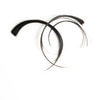|
While I was researching the "extinction of blondes" I came across similar claims about redheads.
Over the years many news organizations have reported that redheads or "gingers," would eventually become extinct. Other news outlets and blogs picked up the story, citing the "Oxford Hair Foundation" or "genetic scientists" who claimed that there would be no more redheads by as early as 2060. It turns out that all those people were wrong. Redheads are here to stay and should be around well beyond 2060. These articles work on the mistaken assumption that recessive genes -- like the one for red hair -- can "die out." Recessive genes can become rare but don't disappear completely unless everyone carrying that gene dies or fails to reproduce. So while red hair may remain rare, enough people carry the gene that, barring global catastrophe, redheads should continue to appear for some time. Some of the articles discussing redhead extinction referred to the Oxford Hair Foundation as an "independent" institute or research foundation, but a Google search shows that the Oxford Hair Foundation is funded by Proctor & Gamble, makers of numerous beauty products -- including red hair dye. In the most recent wave of redhead extinction warnings, some news outlets incorrectly cited the September 2007 issue of National Geographic as the source of the extinction claims. Others, correctly, cited that issue of National Geographic for the statistics it presented in a short piece on redheads. In fact, the National Geographic story provided some data about red hair in the world population, but it only said that "news reports" have claimed that redheads were going extinct. The piece did not explicitly back the claim. Instead, the article stated that "while redheads may decline, the potential for red isn't going away". Unfortunately the misconception about disappearing redheads is now widespread. Experts who have been interviewed agree that the redhead extinction claim is bogus. David Pearce from the University of Rochester Medical Center told the Rochester Democrat and Chronicle in 2005 -- after the last round of redhead extinction news -- that the scientists behind the original claim should "check their calculator". Rick Sturm, a researcher in hair and skin genetics at the University of Queensland, told the Australian Broadcasting Company that "there's no shortage of red-heads" and that the Oxford Hair Foundation didn't provide sufficient scientific evidence to prove its findings. Red hair is caused by a mutation in the MC1R gene. It's also a recessive trait, so it takes both parents passing on a mutated version of the MC1R gene to produce a redheaded child. Because it's a recessive trait, red hair can easily skip a generation. It can then reappear after skipping one or more generations if both parents, no matter their hair color, carry the red hair gene. (source: Science: HowStuffWorks) Hair by Brian - The Beauty Blog
2 Comments
1/29/2023 01:39:26 am
These articles work on the mistaken assumption that recessive genes
Reply
Hair by Brian
1/31/2023 07:02:27 am
That is exactly what this article says.
Reply
Your comment will be posted after it is approved.
Leave a Reply. |
Hair by BrianMy name is Brian and I help people confidently take on the world. CategoriesAll Advice Announcement Awards Balayage Barbering Beach Waves Beauty News Book Now Brazilian Treatment Clients Cool Facts COVID 19 Health COVID 19 Update Curlies EGift Card Films Follically Challenged Gossip Grooming Hair Care Haircolor Haircut Hair Facts Hair History Hair Loss Hair Styling Hair Tips Hair Tools Health Health And Safety Healthy Hair Highlights Holidays Humor Mens Hair Men's Long Hair Newsletter Ombre Policies Procedures Press Release Previous Blog Privacy Policy Product Knowledge Product Reviews Promotions Read Your Labels Recommendations Reviews Scalp Health Science Services Smoothing Treatments Social Media Summer Hair Tips Textured Hair Thinning Hair Travel Tips Trending Wellness Womens Hair Archives
June 2025
|
|
Hey...
Your Mom Called! Book today! |
Sunday: 11am-5pm
Monday: 11am-6pm Tuesday: 10am - 6pm Wednesday: 10am - 6pm Thursday: By Appointment Friday: By Appointment Saturday: By Appointment |


 RSS Feed
RSS Feed